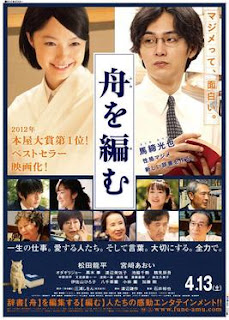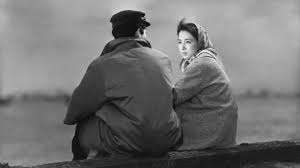“The Great Passage” was the film that most of the Japanese film competitions selected as the best for 2013, and the official selection for the Best Foreign Language Film Oscar. Based on the bestseller by Shion Miura, the film focuses on the creation of a dictionary, a truly difficult profession.
Buy This Title
In 1995, Mitsuya Majime, a salesman with a degree in languages and very few social skills, is working in the sales department of Genbu books. When Kouhei Araki, the man in charge of the vocabularies department in the company, decides to quit to take care of his sick wife, he chooses Majime as his successor. The department is tasked with creating a new vocabulary, with the titular name, with the purpose of being “live”, including all contemporary words and slang.
Although the task is humongous and the time very much needed, Majime throws himself completely into his work, under the supervision of Tomosuke Matsumoto, and with the help of the talkative Masashi Nishioka and the other employees of the department. In order to accomplish his task, Majime is forced to get out of his shell, and he eventually falls in love with Kaguya Hayashi, the granddaughter of his proprietor.
Yuya Ishii directs a genuinely Japanese film, in theme, style and pace, in the very difficult task of making the compiling of a dictionary into an entertaining movie. The fact that he succeeds in presenting a number of very interesting scenes in the world of vocabularies, which is filled with tabs and excel sheets, is his biggest accomplishment.
Inside the rapidly changing setting of the 90s, with the explosion of youth culture through video games, mobile phones and the Internet, Ishii manages to present the traditional Japanese values (patience, dedication, diligence, teamwork and the respect towards the elders) in the most appealing way. Like the compiling of a dictionary, the film flows slowly, patiently and the same applies to the characters' analysis and their relationships. Sentimentality is one of the key elements, but Ishii does not allow it to touch even the borders of the melodrama, as he manages to present the good and the bad of life and love without hypocritical dramatization, retaining a steady style throughout the duration of the film.
Along with a number of subtle, humorous moments, the film remains appealing, and the 133 of its minutes are not bothersome at all. This last part is mirrored in a number of scenes, like the one where Majime is hired by giving the definition of the word ‘right', and the one where the whole team are trying to discover the latest slang by eavesdropping on high school girls. On the other hand, I found the romantic part unsurprising, to say the least, since it consists of a very generic story regarding a question of whether the protagonists will end up together.
Ryuhei Matsuda as Majime is great as the eccentric bookworm, as he gives life to a character who seems to fit in novels rather than films. His laconic presence works wonders for the movie, with the story revolving around him.On of the greatest aspects of his performance is that he manages to present an unsocial man as utterly appealing, without ridiculing him or playing him as a social retard. Aoi Miyazaki has an undemanding role that does not require much apart from her supporting Majime in silence and looking pretty when she cooks. In the sole scene she has to really act though, she is quite good. Joe Odagiri is one of the assets of the film as Masashi, as he adds social realism to the story, since his character is the only one who actually has a life outside the office. Ηe is present in the majority of the comic scenes, in one of the most significant aspects of his role, and he manages to be funny, without becoming ridiculous at any moment. In general, all of the actors in the cast are good in their parts, and are very convincing as members of a team who care and love each other, through their focus in a common cause.
“The Great Passage” is a great sample of contemporary Japanese cinema, that stands from the plethora of similar productions due to the direction, the cast and acting, and the attention to every details.



















